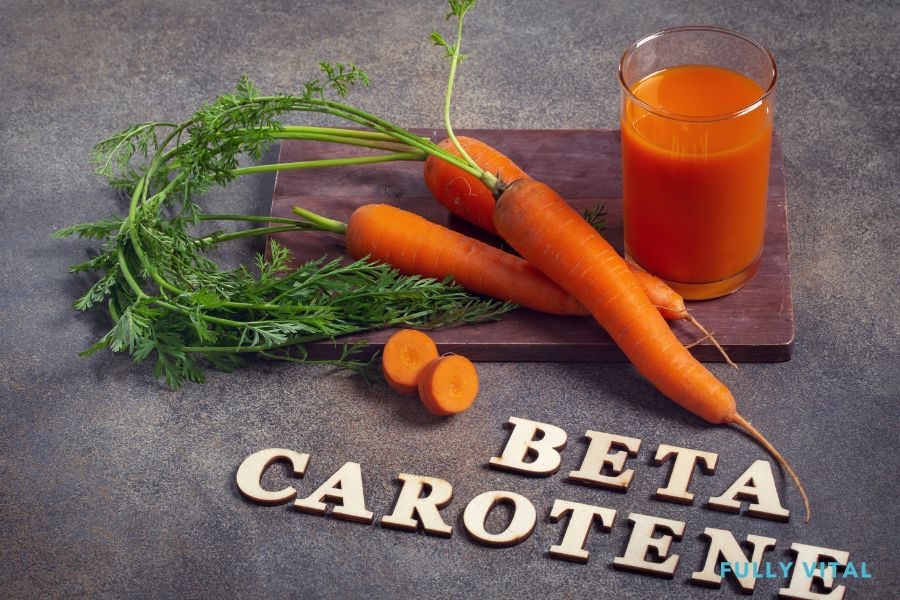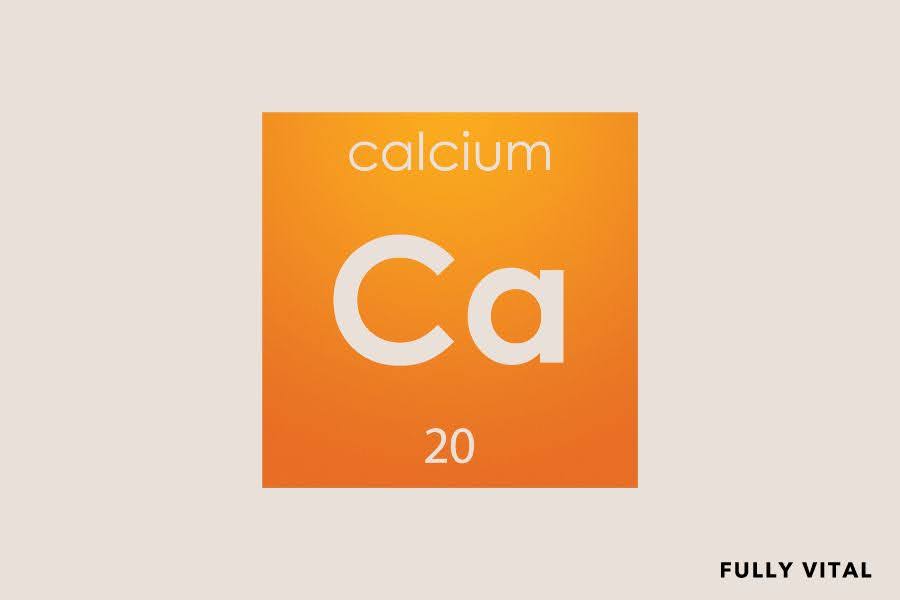
Beta-carotene: Colorful Carrots for Colorful Hair
Incorporating beta-carotene into your diet is a great start, but for those looking to further enhance their hair's health and density, Fully Vital's Enhance Hair Density Serum offers a complementary solution.
This innovative serum is designed to nurture your hair at the roots, harnessing the power of natural ingredients to promote fuller, thicker hair.
By combining your dietary efforts with the targeted action of the Enhance Hair Density Serum, you can achieve even more remarkable results in your journey to a vibrant, healthy mane.

I LOVE MY HAIR NOW
FullyVital hair serum and hair vitamins made tremendous improvements in my hair. I truly love my hair now.
Shop Hair ProductsWhat Is Beta-Carotene?
The Basics Of Beta-Carotene
Beta-carotene, a naturally occurring pigment, is responsible for the vibrant orange, yellow, and red hues in many fruits and vegetables.
It belongs to a group of pigments called carotenoids and is a precursor to vitamin A, an essential nutrient vital for various bodily functions, including vision and immune response.
Notably, in the context of hair health, vitamin A plays a crucial role in the production of sebum, which moisturizes the scalp and keeps hair healthy.
Beta-carotene, with its antioxidant properties, also helps protect the body from free radicals, which can lead to premature aging and various health issues.
Natural Sources Of Beta-Carotene
Apart from carrots, beta-carotene is abundantly found in sweet potatoes, pumpkins, spinach, and kale.
These foods not only contribute to a well-balanced diet but also offer a natural and effective way to boost your vitamin A intake.
Other good sources include apricots, broccoli, and peas.
For those seeking to enhance their hair health, incorporating these foods into your diet can be a delicious and nutritious strategy.
It's important to remember that the absorption of beta-carotene is enhanced when consumed with fats, so a balanced diet with healthy fats is optimal for its uptake.

How Is Beta-Carotene Connected To Hair Health?
Nutritional Value For Hair
Beta-carotene's conversion into vitamin A in the body is critical for hair health, as vitamin A aids in the production of sebum.
Sebum is the natural oil secreted by the scalp, which keeps hair moisturized and healthy.
A deficiency in vitamin A can lead to a dry scalp and hair, leading to hair loss and a dull appearance.
Moreover, vitamin A's role in cell growth supports the growth of healthy hair.
It's also vital in repairing hair damage, ensuring that hair not only grows but also maintains its strength and luster.
How Beta-Carotene Affects Hair Growth And Quality
Vitamin A, derived from beta-carotene, plays a pivotal role in cell growth, particularly for hair, the fastest growing tissue in the human body.
Adequate intake of beta-carotene can help in maintaining a healthy rate of hair growth and improving hair quality.
It helps in fortifying hair follicles, reducing the risk of hair thinning and breakage.
Additionally, the antioxidant properties of beta-carotene help in protecting hair cells from damage caused by free radicals.
This can result in less brittle, more resilient hair, contributing to an overall healthier and more vibrant appearance.
What Scientific Evidence Supports The Benefits Of Beta-Carotene?
Research Findings
Several studies highlight the importance of beta-carotene in maintaining healthy hair.
Research has shown that beta-carotene’s antioxidant properties play a significant role in protecting hair follicles against damage from harmful free radicals.
This protection is crucial in maintaining the integrity and health of hair cells.
Additionally, scientific research supports the role of vitamin A in promoting hair growth and preventing hair disorders.
The effectiveness of beta-carotene in boosting vitamin A levels makes it a valuable nutrient for those looking to improve their hair health.
Expert Opinions
Healthcare and nutrition experts often recommend incorporating beta-carotene-rich foods into one's diet as a natural way to enhance hair health.
They emphasize the importance of a balanced diet, which includes a variety of nutrients essential for hair growth and maintenance.
Experts also suggest that while beta-carotene supplements can be beneficial, obtaining it from natural food sources ensures a more holistic approach to nutrition and minimizes the risk of excessive intake, which can be harmful.
How Can You Incorporate Beta-Carotene Into Your Diet?
Daily Recommended Intake
The recommended daily intake of beta-carotene varies depending on factors like age, gender, and overall health.
While there is no specific recommended amount for beta-carotene alone, health experts suggest that a diet rich in various carotenoids, including beta-carotene, is beneficial.
It's important to include a variety of fruits and vegetables in your diet to ensure a balanced intake of these essential nutrients.
As a fat-soluble compound, pairing beta-carotene-rich foods with healthy fats can enhance absorption.
Easy Ways To Add More Beta-Carotene
Incorporating beta-carotene into your diet can be both simple and delicious.
Adding a serving of carrots or sweet potatoes to your meals, or including leafy greens like spinach in salads and smoothies, are easy ways to boost your intake.
Experimenting with recipes that include beta-carotene-rich ingredients can make your meals more colorful and nutritious.
Remember, cooking these foods can make beta-carotene more available to the body, so consider a mix of raw and cooked sources for optimal benefits.
Beta-Carotene Supplements Vs. Natural Sources
Pros And Cons Of Supplements
Supplementing with beta-carotene offers a convenient way to ensure consistent intake, especially for individuals with dietary restrictions or limited access to fresh produce.
However, it's crucial to be cautious with dosages, as excessive intake from supplements can lead to side effects such as carotenemia, where the skin turns slightly orange.
Moreover, supplements can't replicate the array of nutrients and fiber found in whole foods, which contribute to overall health and well-being.
Best Practices For Natural Intake
To maximize the benefits of beta-carotene, integrating a variety of sources into your diet is recommended.
This not only ensures a broader intake of nutrients but also reduces the risk of overconsumption associated with supplements.
Cooking beta-carotene-rich vegetables with a fat source, like olive oil, can enhance absorption due to its fat-soluble nature.
Additionally, a balanced diet including fruits, vegetables, and healthy fats supports overall health, aligning with the Fully Vital philosophy of holistic wellness.
What Are The Potential Side Effects And Considerations To Keep In Mind When Using Beta-Carotene?
Safe Consumption Levels
Beta-carotene obtained from food is generally considered safe, with no established upper limit.
However, when it comes to supplements, it's important to adhere to the recommended dosage on the product label or consult a healthcare professional.
Excess beta-carotene, particularly from supplements, can lead to health issues such as carotenemia or, in rare cases, increased risk of lung cancer in smokers.
When To Consult A Healthcare Provider
It's advisable to consult a healthcare provider before beginning any new supplement regimen, especially for individuals with pre-existing health conditions or those taking medications.
This consultation ensures that the supplement won't interfere with any medical conditions or treatments.
Pregnant or breastfeeding women should also seek medical advice before taking beta-carotene supplements.

How Is Beta-Carotene Used In Hair Care Products?
Identifying Quality Products
When selecting hair care products containing beta-carotene, look for brands that prioritize natural and holistic ingredients.
Check the ingredient list for beta-carotene or Vitamin A and avoid products with harmful chemicals or artificial additives.
Quality products will often highlight their natural ingredients and their benefits for hair health.
Fully Vital’s Approach To Natural Ingredients
Fully Vital incorporates a holistic approach in their hair care products, focusing on natural, vegan ingredients that nurture hair from the roots.
Their products are formulated with a blend of natural extracts and essential nutrients, including beta-carotene, to promote healthy hair growth and scalp health.
This aligns with their philosophy of natural, sustainable, and effective hair care.
Discover The Power Of Fully Vital Hair Growth ProductsAt Fully Vital, we strive to offer the best hair growth products that are scientifically formulated to stop and reverse the aging of your hair. Our range of products comes with a variety of features and benefits to help you achieve your hair growth goals. Key Features:
Benefits:
Ready to transform your hair? Check out our range of Fully Vital hair growth products and rediscover the joy of healthy, vibrant hair. |
Final Thoughts On Beta-Carotene
Beta-carotene's role in promoting healthy, vibrant hair is clear, whether it's consumed through a balanced diet or applied in quality hair care products.
By understanding and leveraging the benefits of this potent nutrient, individuals can take a significant step towards achieving and maintaining healthy, lustrous hair.
As part of a holistic approach to wellness, embracing the natural power of beta-carotene aligns perfectly with Fully Vital's philosophy of nurturing hair health from within.
In line with this, Fully Vital's Enhance Hair Serum (3-Pack) offers a tailored solution to support and enrich your hair's vitality.
Infused with essential nutrients and designed for optimal hair health, this serum is a practical and effective way to incorporate the principles of natural care into your daily routine.
Check out our recent blogs:
- Protein Overload: Causes, Symptoms, And Solutions For Hair
- Relaxer Hair Dos And Don'ts: Essential Care And Maintenance
- Chic Trends: Embrace Elegance With Grey Highlights
Final Thoughts On Beta-Carotene
What are the antioxidant properties of beta-carotene?
Beta-carotene acts as an antioxidant, helping to prevent cellular damage from free radicals, which can lead to chronic diseases like cancer, heart disease, and Alzheimer’s disease.
Does beta-carotene have anti-inflammatory benefits?
Yes, beta-carotene provides anti-inflammatory benefits, which can help in managing chronic inflammation and associated conditions.
How does beta-carotene support healthy vision?
Beta-carotene is converted to vitamin A in the body, which is crucial for healthy vision.
It helps the brain interpret light and keeps the retinas healthy, reducing the risk of dry eyes, cataracts, and age-related macular degeneration.
What are some high beta-carotene foods?
Foods rich in beta-carotene include sweet potatoes, carrots, butternut squash, cantaloupe, romaine lettuce, red peppers, spinach, apricots, broccoli, pea pods, and mango.
How much beta-carotene should I get daily?
There's no specific recommended amount for beta-carotene.
However, the upper limit for vitamin A (which beta-carotene converts into) for adults over 19 is 3,000 mcg per day.
Excessive vitamin A can be harmful, but beta-carotene is converted to vitamin A only as needed by the body.
Should I take beta-carotene supplements?
Beta-carotene supplements are available but should be approached with caution, especially for smokers or those exposed to asbestos, as they may increase the risk of lung cancer.
It's recommended to prioritize dietary sources over supplements.
Are there specific conditions that increase the need for vitamin A?
Conditions such as cystic fibrosis, long-term diarrhea, serious injuries, liver disease, malabsorption problems, and pancreas disease may increase the need for vitamin A.
Can beta-carotene be used as a sunscreen?
Claims that beta-carotene acts as a sunscreen have not been proven.
While it's being studied for its potential in reducing the risk of certain types of cancer, conclusive evidence is not yet available.
Are there any specific medical considerations when using beta-carotene?
Those with eating disorders, kidney disease, or liver disease should be cautious, as these conditions may lead to high blood levels of beta-carotene and increase the chance of side effects.
What are the side effects of beta-carotene?
Common side effects include yellowing of palms, hands, soles of feet, and sometimes the face.
Rare side effects can include diarrhea, dizziness, joint pain, and unusual bleeding or bruising.
Sources:
- National Institutes of Health. (n.d.). Beta-Carotene: Fact Sheet for Health Professionals. Retrieved from https://ods.od.nih.gov/factsheets/BetaCarotene-HealthProfessional/
- Harvard T.H. Chan School of Public Health. (n.d.). The Nutrition Source: Vitamin A. Retrieved from https://www.hsph.harvard.edu/nutritionsource/vitamin-a/
- Mayo Clinic. (2021). Beta-carotene. Retrieved from https://www.mayoclinic.org/drugs-supplements-beta-carotene/art-20365983
- Oregon State University. (n.d.). Micronutrient Information Center: Carotenoids. Retrieved from https://lpi.oregonstate.edu/mic/dietary-factors/phytochemicals/carotenoids
- American Academy of Dermatology Association. (n.d.). Do you have hair loss or hair shedding? Retrieved from https://www.aad.org/public/diseases/hair-loss/insider/shedding
- Medical News Today. (2021). What to know about beta-carotene. Retrieved from https://www.medicalnewstoday.com/articles/252758
- Cleveland Clinic. (2020). The Best Vitamins, Supplements and Products for Healthier Hair. Retrieved from https://health.clevelandclinic.org/the-best-vitamins-supplements-and-products-for-healthier-hair/
- WebMD. (n.d.). Beta-Carotene. Retrieved from https://www.webmd.com/vitamins/ai/ingredientmono-999/beta-carotene
- Healthline. (2020). Can You Overdose on Vitamins? Retrieved from https://www.healthline.com/nutrition/can-you-overdose-on-vitamins
- Mount Sinai. (n.d.). Beta-carotene. Retrieved from https://www.mountsinai.org/health-library/supplement/beta-carotene
- Cleveland Clinic. (n.d.). Beta-Carotene: Benefits and Best Sources. Retrieved from https://health.clevelandclinic.org
- Drugs.com. (n.d.). Beta carotene Advanced Patient Information. Retrieved from https://www.drugs.com/cons/beta-carotene.html








